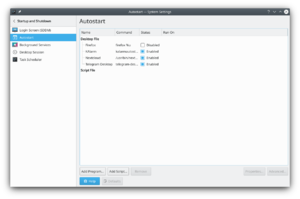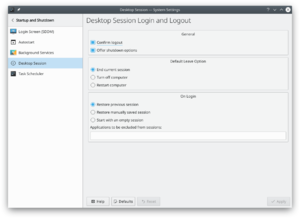System Settings/Startup and Shutdown/ro: Difference between revisions
No edit summary |
Updating to match new version of source page |
||
| (6 intermediate revisions by 2 users not shown) | |||
| Line 1: | Line 1: | ||
<languages /> | <languages /> | ||
= | {|class="tablecenter vertical-centered" | ||
|[[Image:Settings-startup-and-shutdown.png|300px|thumb|center|Settings affecting startup and shutdown of your workspace]] | |||
|} | |||
{{PreferenceHelp}} | |||
__TOC__ | |||
{{PrefIcon|System-run.png|Autostart}} | |||
This article describes how to use the program ''systemsettings'' to configure KDE's startup. To follow this chapter, run <menuchoice>systemsettings</menuchoice> and choose <menuchoice>Startup and Shutdown</menuchoice> > <menuchoice>Autostart</menuchoice>. | |||
Aici puteţi configura ce aplicaţii sau scrip-uri ar trebui rulate de îndată ce vă conectaţi la [[Special:myLanguage/Plasma|Plasma Desktop Workspace]]. Poate doriţi să adăugaţi aici aplicaţii care întotdeauna funcţionează, precum [[Special:myLanguage/KAlarm|KAlarm]] sau [[Special:myLanguage/KTorrent|KTorrent]]. | Aici puteţi configura ce aplicaţii sau scrip-uri ar trebui rulate de îndată ce vă conectaţi la [[Special:myLanguage/Plasma|Plasma Desktop Workspace]]. Poate doriţi să adăugaţi aici aplicaţii care întotdeauna funcţionează, precum [[Special:myLanguage/KAlarm|KAlarm]] sau [[Special:myLanguage/KTorrent|KTorrent]]. | ||
Clicking <menuchoice>Add Program...</menuchoice> opens the usual application picker dialog from which you can select an application. A desktop file for the application will be created in the autostart folder. When you have selected an application a <menuchoice>Properties</menuchoice> dialog will open. Just click <menuchoice>OK</menuchoice> and you are done. You can modify the properties of the application later: select the application in the list and click <menuchoice>Properties</menuchoice> to bring up the dialog again. | |||
You can temporarily suspend automatic start up of an application by deselecting the check box in the <menuchoice>Status</menuchoice> column. You can also specify that the application should only start when you log in to a KDE session. To do that, select the application, click <menuchoice>Advanced</menuchoice> and mark the check box. | |||
Clicking the <menuchoice>Add Script...</menuchoice> you will be asked for the path to a script; write the path in the text box or click the {{Icon|document-open}} button to get a file picker dialog. If you deselect the <menuchoice>Create as symlink</menuchoice> option the script file will be copied to the autostart folder; otherwise a link will be created. You can use the <menuchoice>Properties</menuchoice> and <menuchoice>Advanced</menuchoice> buttons in the same way as for applications. | |||
With scripts you have one further option: in the <menuchoice>Run On</menuchoice> column you will find a dropdown list with three options: <menuchoice>Startup</menuchoice>, <menuchoice>Shutdown</menuchoice> and <menuchoice>Pre-KDE Startup</menuchoice>, which determine when the script is run - at startup (after the desktop is started), when you log out, or during start up of the desktop, respectively. Note, that to use either of the last two options, the script must have the <tt>.sh</tt> extension. | |||
{{PrefIcon|Preferences-system-session-services.png|Service Manager}} | |||
{{PrefIcon|Preferences-system.png|Session Management}} | |||
{|class="tablecenter vertical-centered" | |||
|[[image:Snapshot-kde-session-manager-config.png|300px|thumb|center|Settings affecting session restore&co]] | |||
|} | |||
Session Management allows you to choose how KDE should look when you log in: | |||
* Restore previous session | |||
* Restore manually saved session | |||
* Start with an empty session | |||
{{Info|To manually save a session, you must first select the <menuchoice>Restore manually saved session</menuchoice> option and <menuchoice>Apply</menuchoice>. Then, when you use the <menuchoice>KDE Menu -> Leave</menuchoice> you will find that you have a new option - <menuchoice> Save Session</menuchoice>.}} | |||
== See also == | |||
* [[Special:myLanguage/Session Environment Variables|Session Environment Variables]] | |||
[[Category:Desktop]] | [[Category:Desktop]] | ||
[[Category:System]] | [[Category:System]] | ||
[[Category:Configuration]] | |||
[[Category:Needs work]] | |||
Latest revision as of 10:55, 20 October 2022
 |

Autostart
This article describes how to use the program systemsettings to configure KDE's startup. To follow this chapter, run and choose > .
Aici puteţi configura ce aplicaţii sau scrip-uri ar trebui rulate de îndată ce vă conectaţi la Plasma Desktop Workspace. Poate doriţi să adăugaţi aici aplicaţii care întotdeauna funcţionează, precum KAlarm sau KTorrent.
Clicking opens the usual application picker dialog from which you can select an application. A desktop file for the application will be created in the autostart folder. When you have selected an application a dialog will open. Just click and you are done. You can modify the properties of the application later: select the application in the list and click to bring up the dialog again.
You can temporarily suspend automatic start up of an application by deselecting the check box in the column. You can also specify that the application should only start when you log in to a KDE session. To do that, select the application, click and mark the check box.
Clicking the you will be asked for the path to a script; write the path in the text box or click the ![]() button to get a file picker dialog. If you deselect the option the script file will be copied to the autostart folder; otherwise a link will be created. You can use the and buttons in the same way as for applications.
button to get a file picker dialog. If you deselect the option the script file will be copied to the autostart folder; otherwise a link will be created. You can use the and buttons in the same way as for applications.
With scripts you have one further option: in the column you will find a dropdown list with three options: , and , which determine when the script is run - at startup (after the desktop is started), when you log out, or during start up of the desktop, respectively. Note, that to use either of the last two options, the script must have the .sh extension.

Service Manager

Session Management
 |
Session Management allows you to choose how KDE should look when you log in:
- Restore previous session
- Restore manually saved session
- Start with an empty session

